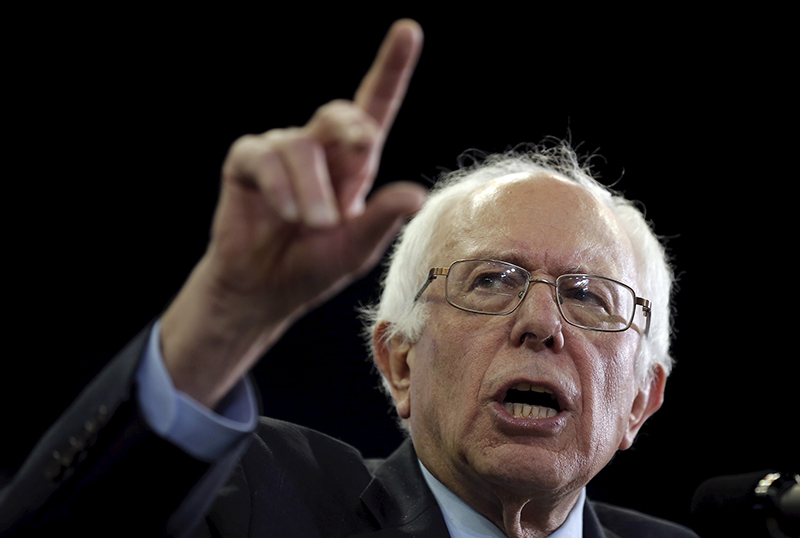
Democratic presidential candidate Bernie Sanders speaks at a campaign rally in Ypsilanti, Mich., on Feb. 15, 2016. Photo courtesy of REUTERS/Jim Young
*Editors: This photo may only be republished with RNS-GUROCK-COLUMN, originally transmitted on Feb. 16, 2016.
(RNS) August 19, 2000, was a blue-letter day for me as a historian and observer of American Jewish life.
In the wake of Sen. Joseph Lieberman’s nomination that previous evening for the vice presidency of the U.S., more than a dozen media outlets queried me about the significance of a Jew — and an Orthodox one to boot — earning such a rarefied slot on a national party ticket.
For me, Lieberman’s elevation signified a new level of acceptance for the Jewish people in America. In the days that followed, I was pleased that his steadfast Jewishness played well on America’s streets, particularly among those of deep religious faith. Indeed, as the campaign proceeded, any apprehension that this unanticipated designation might not be good for Jews dissipated.
This year, I kept my cellphone on during the run-up to the New Hampshire primary, and in the aftermath of Bernie Sanders’ victory have awaited tweets and texts from TV, radio and print outlets.
But nothing!
The only questioning I have received was from a Jewish media outlet that wondered: Why hasn’t the Jewish community strongly embraced one of its own?
The wide disinterest in Sanders’ religious or ethnic background underscores how well-integrated Jews are in America; during a campaign season pockmarked by nativism and fear of minorities, Jewish presence, status and influence in America are almost nowhere a factor in political calculi.
Only the most extreme anti-Semitic voices have spoken about Sanders’ “Jewish socialism.” All other Americans are either enthused or concerned about the Vermont senator’s “democratic socialism” but have little to say about his Jewishness.
It has remained for an Israeli journalist — as The New York Times reported — to worry out loud about how, down the road, “Sanders fits the bill of the GOP’s favorite Jewish bogeyman, Saul Alinsky.” It will be recalled that back in 2008, this radical community organizer was projected as a mentor and associate of then-candidate Barack Obama.
I do not buy the Alinsky metaphor because it is worthwhile to note that his Jewishness was not under suspicion or attack by the Republicans.
For me it is rather a point of emphasis and optimism about America that a Jew, two Latinos, an African-American and two women have their dedicated and enthusiastic supporters in this present electoral go-round.
Where Sanders’ Jewishness will be under constant consideration and scrutiny — if his candidacy moves persistently forward beyond the New England triumph — is within the Jewish community. A debate over a Jewish candidate who does not speak openly about his religious or ethnic roots, even if he speaks with a New York accent, may well point out yet another significant point of demarcation within a group that harbors differing priorities and defies easy characterization.
Sanders’ social and economic welfare agenda will certainly continue to play well among those many Jews for whom liberalism or progressivism — call it what you may — has been an essential part of their identities from the days their great-grandparents voted first for socialists in downtown election districts before putting their faith in FDR’s New Deal.
For them, Sanders is certainly “one of their own.” Others, however, will await clearer definition of his positions on the Middle East before embracing or rejecting him. They will unquestionably want fuller explication of what “evenhandedness” in addressing the ever-present Israeli-Palestinian conflict might mean in a Sanders administration.
Reactions to whatever the candidate ultimately has to say, as his positions are challenged even more aggressively in many quarters, will lead some Jews to reaffirm their affinity for Sanders and to tighten their hug. Others will be disappointed, if not antagonistic, to his stances.
Early returns on his positions based on his support of the Iran agreement, which removed sanctions from the regime, and his disdain for Israeli Prime Minister Benjamin Netanyahu’s appearance before Congress have led to the raising of red flags among some segments of American Jewry.

Jeffrey S. Gurock is the Libby M. Klaperman Professor of Jewish History at Yeshiva University and the author or editor of 15 books, including “Jews in Gotham: New York Jews in a Changing City, 1920-2010.” Photo by V. Jane Windsor, courtesy of DKC News
At the same time, Sanders’ making of fundamental distinctions between Hamas and other Palestinian groups and leaders has given him a green light in other Jewish quarters. Those who articulated the greatest worries about the candidate’s position on Israel’s current governmental policies have been sure to note his meeting with the liberal J Street lobby. Others who have their comparable difficulties with Netanyahu have applauded Sanders’ fact-finding efforts.
For a historian observer, whether or not Sanders’ campaign picks up additional momentum, the responses to the statements and actions of the first Jewish presidential candidate to win a primary election will be useful as yet another means of defining that group’s identities in the United States.
(Jeffrey S. Gurock is the Libby M. Klaperman Professor of Jewish History at Yeshiva University and the author or editor of 15 books, including “Jews in Gotham: New York Jews in a Changing City, 1920-2010”)




